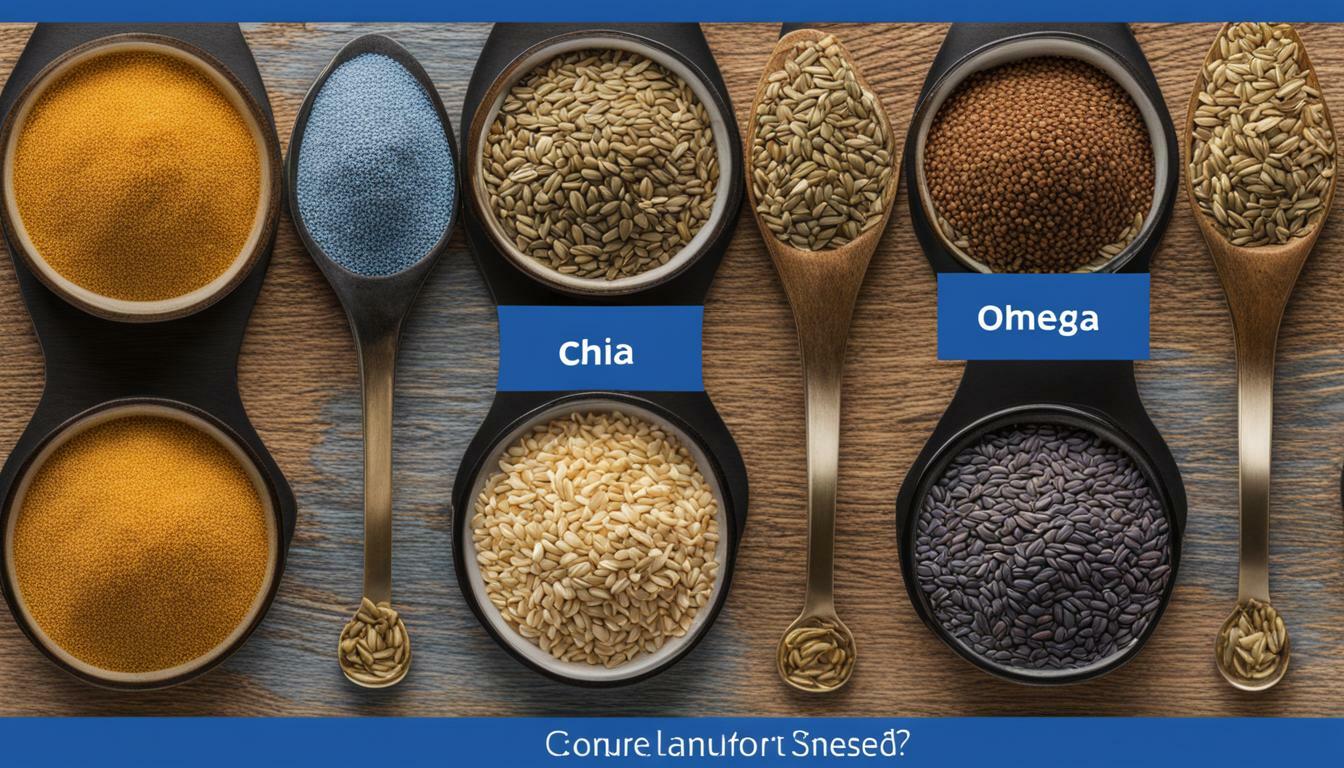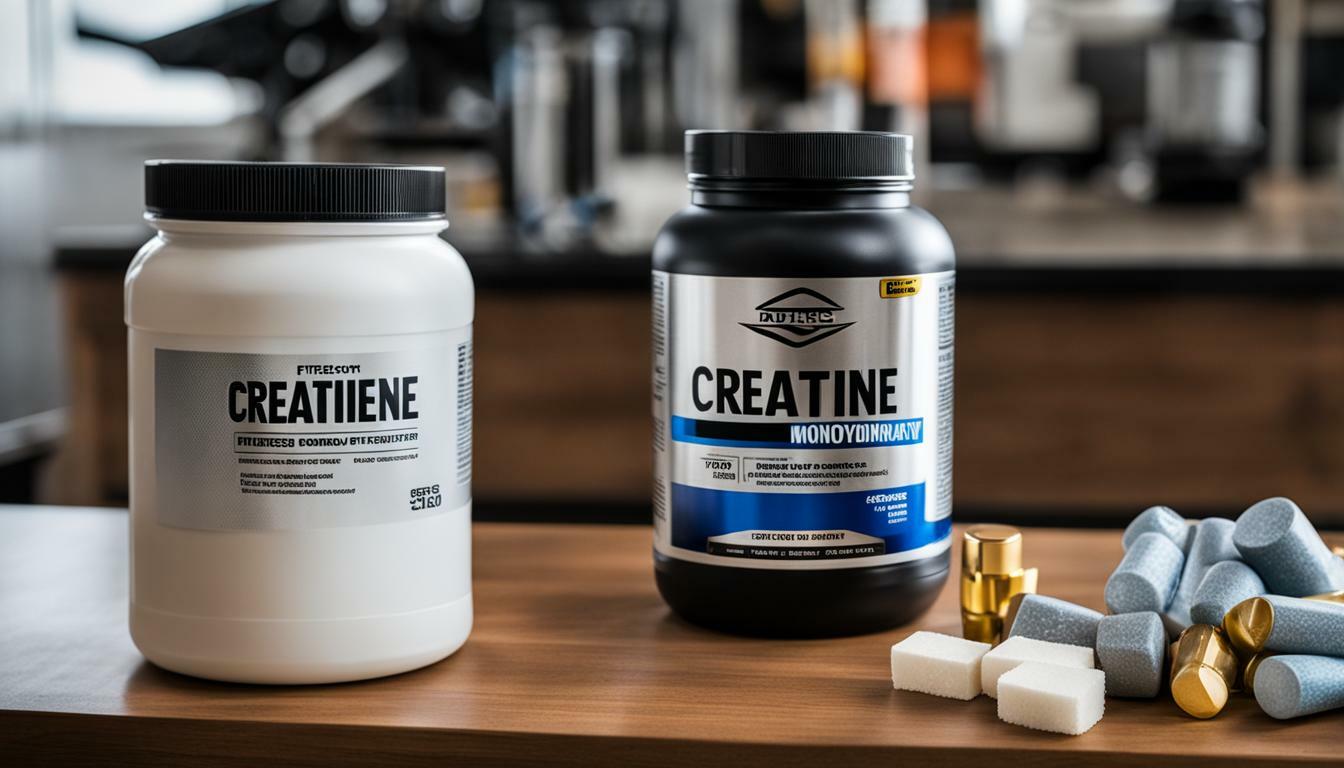Grapeseed oil and flaxseed oil are two distinct types of oils that offer unique benefits for your health and culinary creations. Flaxseed oil is rich in omega-3 fatty acids, particularly alpha-linolenic acid (ALA), which provides various health benefits such as lowering blood pressure and improving cholesterol levels. On the other hand, grapeseed oil is high in oligomeric proanthocyanidin complexes (OPC), antioxidants that may help lower LDL cholesterol and maintain blood vessel integrity.
When it comes to cooking, there are important differences between these oils. Flaxseed oil has a low smoke point, making it unsuitable for high-heat cooking. However, it can be used as a finishing oil or in salad dressings to add a nutritional boost. Grapeseed oil, on the other hand, has a high smoke point, making it a versatile choice for frying, sautéing, and baking.
- Flaxseed oil is rich in omega-3 fatty acids and offers health benefits such as improving cholesterol levels.
- Grapeseed oil contains antioxidants that may help lower LDL cholesterol and maintain blood vessel integrity.
- Flaxseed oil has a low smoke point and is not suitable for high-heat cooking.
- Grapeseed oil has a high smoke point, making it versatile for various cooking methods.
- Both oils can be used in different ways to enhance the flavor and nutritional value of your meals.
Grapeseed Oil Benefits
Grapeseed oil is packed with beneficial properties that can enhance your health and elevate your culinary creations. This light and versatile oil, derived from the seeds of grapes, is not only delicious but also offers a range of health benefits.
One of the key advantages of grapeseed oil is its high smoke point, making it ideal for cooking at high temperatures. Unlike many other oils, grapeseed oil can withstand heat without breaking down or producing harmful compounds. Whether you’re sautéing, frying, or grilling, grapeseed oil can be your go-to cooking companion.
In addition to its cooking benefits, grapeseed oil is rich in antioxidants known as oligomeric proanthocyanidin complexes (OPC). These antioxidants have been linked to numerous health benefits, including reducing LDL cholesterol levels and promoting cardiovascular health. With its heart-healthy properties, grapeseed oil can be a valuable addition to a balanced diet.
| Grapeseed Oil Benefits | Summary |
|---|---|
| High smoke point | Ideal for high-temperature cooking methods |
| Contains OPC antioxidants | May help lower LDL cholesterol and promote heart health |
Furthermore, grapeseed oil is known for its light and neutral flavor, allowing it to complement a wide range of dishes without overpowering their natural taste. Whether you’re preparing a salad dressing, marinade, or stir-fry, grapeseed oil can enhance the flavors of your culinary creations without dominating the palate.
So why not incorporate grapeseed oil into your cooking routine? Not only will it bring out the best in your dishes, but it may also contribute to your overall well-being. With its high smoke point, heart-healthy properties, and versatile flavor, grapeseed oil is a valuable ingredient in any kitchen.
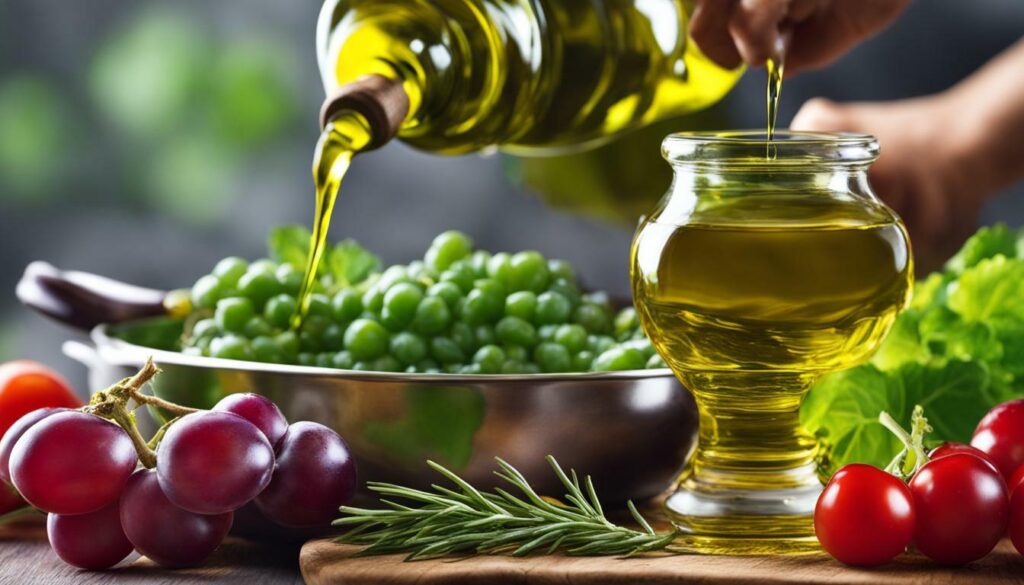
Flaxseed oil offers a range of health benefits, making it a valuable addition to your daily routine. Packed with omega-3 fatty acids, particularly alpha-linolenic acid (ALA), flaxseed oil has been linked to numerous positive effects on overall health.
- Heart Health: The omega-3 fatty acids in flaxseed oil have been shown to promote heart health by reducing inflammation, improving blood vessel function, and helping to lower blood pressure. Regular consumption of flaxseed oil may also contribute to the reduction of LDL cholesterol, known as the “bad” cholesterol.
- Brain Function: Omega-3 fatty acids are essential for brain health and cognitive function. Consuming flaxseed oil regularly may help improve memory, focus, and overall brain performance.
- Joint Health: The anti-inflammatory properties of flaxseed oil may help relieve joint pain and stiffness associated with conditions such as arthritis. Adding flaxseed oil to your diet can contribute to improved joint mobility and reduced inflammation.
- Healthy Skin: Flaxseed oil is rich in antioxidants, which can help protect the skin from damage caused by free radicals. Regular consumption of flaxseed oil may improve skin hydration, reduce inflammation, and promote a youthful complexion.
It’s important to note that flaxseed oil should be stored properly to maintain its nutritional value. To prevent oxidation, it is recommended to keep the oil refrigerated in a dark, airtight container. Additionally, flaxseed oil should not be used for cooking as it has a low smoke point. Instead, it can be drizzled over salads, added to smoothies, or used as a nutritional supplement.
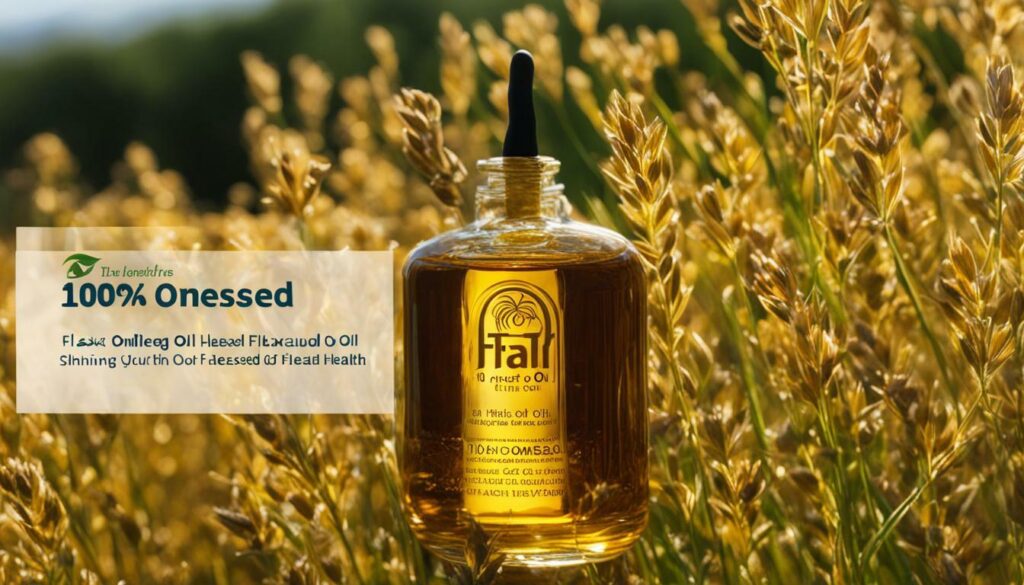
Grapeseed Oil Uses
From cooking to skincare, grapeseed oil is a versatile ingredient that can be used in a variety of ways. Due to its light flavor and high smoke point, grapeseed oil is an excellent choice for cooking methods that require high heat, such as sautéing, stir-frying, and deep-frying. Its neutral taste allows the natural flavors of the ingredients to shine through, making it a popular choice among chefs and home cooks alike.
In addition to its culinary uses, grapeseed oil is also a common ingredient in skincare products. Its high concentration of antioxidants and vitamin E makes it a nourishing and moisturizing oil for the skin. It can be used as a facial moisturizer, makeup remover, or as a base for homemade body scrubs and lotions. Grapeseed oil is lightweight and easily absorbed by the skin, leaving it feeling soft and hydrated.
Furthermore, grapeseed oil can be used as a carrier oil for essential oils, making it ideal for massage therapy or aromatherapy. Its smooth texture and mild scent allow for a relaxing and therapeutic experience. When used in combination with essential oils, grapeseed oil can enhance their effectiveness and provide a soothing sensation.

Grapeseed Oil Cooking Tips
- Use grapeseed oil for high-temperature cooking methods like frying and baking.
- Combine it with other oils, such as olive oil, for a balanced flavor profile.
- Try using grapeseed oil as a substitute for butter or vegetable oil in baking recipes for a healthier twist.
- Add a drizzle of grapeseed oil to salads or roasted vegetables for extra flavor and nutritional benefits.
In conclusion, grapeseed oil is not only a versatile ingredient in the kitchen but also a beneficial component in skincare and wellness routines. Whether you’re looking for a healthy cooking oil or a natural skincare remedy, grapeseed oil is a fantastic choice that offers a multitude of uses and benefits.
Flaxseed Oil Uses
Flaxseed oil can be used in a myriad of ways, providing both nutritional benefits and enhancing the flavor of your dishes. Its delicate and nutty taste makes it a popular addition to salad dressings, dips, and marinades.
One of the key benefits of flaxseed oil is its high omega-3 fatty acid content, which makes it a valuable supplement for those following a vegetarian or vegan diet. Omega-3 fatty acids are essential for brain health and cardiovascular function, and flaxseed oil is an excellent plant-based source.
Aside from its culinary uses, flaxseed oil also holds great potential as a natural beauty remedy. Its hydrating properties make it a fantastic addition to homemade hair masks and conditioners. It can help nourish dry and damaged hair, leaving it looking and feeling healthier.
To summarize, flaxseed oil is a versatile and nutritious oil that can be used in a variety of ways to support your health and add flavor to your meals. Whether you’re looking to boost your omega-3 intake or enhance your beauty routine, flaxseed oil is a valuable addition to any kitchen pantry.
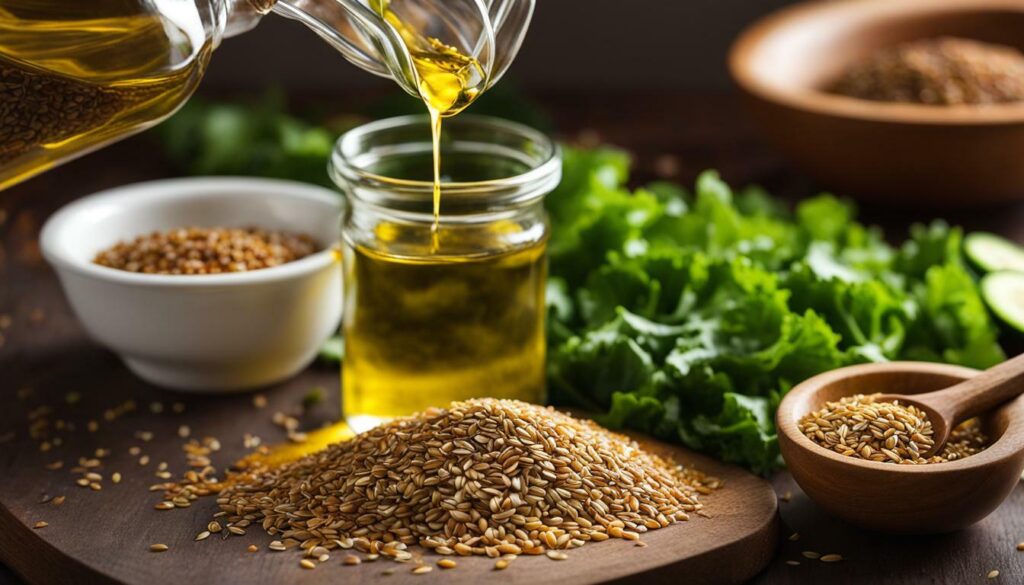
When it comes to choosing between grapeseed oil and flaxseed oil, understanding their differences can help you make an informed decision. These oils have distinct characteristics and are used for different purposes.
Flaxseed oil is rich in omega-3 fatty acids, particularly alpha-linolenic acid (ALA), which offers various health benefits. It can help lower blood pressure and improve cholesterol levels, making it a valuable addition to a balanced diet. However, flaxseed oil is not suitable for cooking due to its low smoke point. Instead, it is best enjoyed raw, added to smoothies, salad dressings, or drizzled over cooked dishes as a finishing oil.
On the other hand, grapeseed oil is high in oligomeric proanthocyanidin complexes (OPC), antioxidants that may help lower LDL cholesterol and maintain blood vessel integrity. With its high smoke point, grapeseed oil is an excellent choice for cooking. It can withstand high temperatures without breaking down and losing its nutritional value. Additionally, grapeseed oil is versatile and can be used for baking, frying, sautéing, and even as a base for homemade salad dressings.
When it comes to seasoning cast iron skillets, oils high in polyunsaturated fats and with a high ratio of polyunsaturated to monounsaturated fat, like grapeseed oil or sunflower oil, are recommended. These oils are known for their ability to create a durable and non-stick seasoning. Flaxseed oil, on the other hand, is not recommended for seasoning as it tends to produce brittle and flaky seasoning. While other common cooking oils like olive oil, canola oil, and vegetable oils can gradually produce seasoning, they may not be as effective as grapeseed oil.
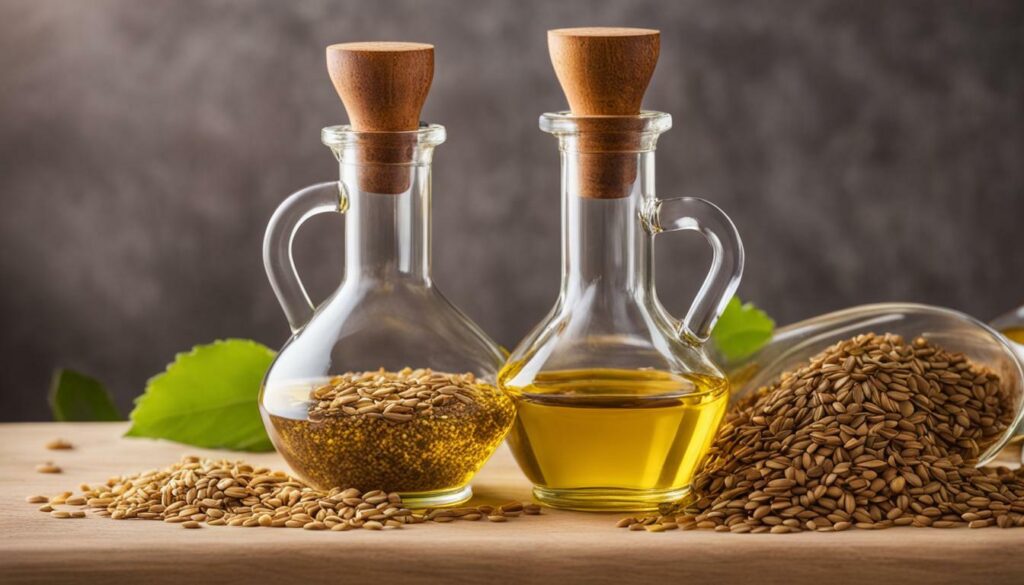
| Grapeseed Oil | Flaxseed Oil |
|---|---|
| High smoke point | Low smoke point |
| Versatile for cooking | Best enjoyed raw |
| Rich in OPC antioxidants | Rich in omega-3 fatty acids |
| Great for seasoning cast iron skillets | Not recommended for seasoning |
Conclusion
Exploring the differences between grapeseed oil and flaxseed oil can help you make the best choice for your health and culinary endeavors. These two oils have distinct characteristics and offer unique benefits.
Flaxseed oil is rich in omega-3 fatty acids, particularly alpha-linolenic acid (ALA), which provides various health benefits such as lowering blood pressure and improving cholesterol levels. However, it is important to note that flaxseed oil is not suitable for cooking due to its low smoke point.
On the other hand, grapeseed oil is high in oligomeric proanthocyanidin complexes (OPC), antioxidants that may help lower LDL cholesterol and maintain blood vessel integrity. It has a high smoke point, making it a good choice for cooking. If you are looking to season cast iron skillets, oils high in polyunsaturated fats with a high ratio of polyunsaturated to monounsaturated fat, like grapeseed oil or sunflower oil, are recommended. Flaxseed oil, however, is not recommended for this purpose as it tends to produce brittle and flaky seasoning.
While other common cooking oils like olive oil, canola oil, and vegetable oils can gradually produce seasoning, they may not be as effective as grapeseed oil. So, if you are looking for an oil that is versatile in cooking and offers health benefits, grapeseed oil can be a great option.
FAQ
What are the main differences between grapeseed oil and flaxseed oil?
Grapeseed oil and flaxseed oil have distinct characteristics. Grapeseed oil is high in oligomeric proanthocyanidin complexes (OPC), antioxidants that may help lower LDL cholesterol and maintain blood vessel integrity. Flaxseed oil, on the other hand, is rich in omega-3 fatty acids, specifically alpha-linolenic acid (ALA), which offers various health benefits such as lowering blood pressure and improving cholesterol levels.
Can flaxseed oil be used for cooking?
Flaxseed oil is not suitable for cooking due to its low smoke point. It is best used as a nutritional supplement or in recipes that do not require high heat.
Is grapeseed oil a good choice for cooking?
Yes, grapeseed oil has a high smoke point, making it an excellent choice for cooking. It can withstand high temperatures without breaking down or emitting harmful smoke.
What oils are recommended for seasoning cast iron skillets?
It is recommended to use oils that are high in polyunsaturated fats and have a high ratio of polyunsaturated to monounsaturated fat, such as grapeseed oil or sunflower oil, for seasoning cast iron skillets. Flaxseed oil is not recommended as it tends to produce brittle and flaky seasoning.
Can other common cooking oils be used for seasoning cast iron skillets?
While other common cooking oils like olive oil, canola oil, and vegetable oils can gradually produce seasoning, they may not be as effective as grapeseed oil or oils high in polyunsaturated fats.
 Skip to main content
Skip to main content
